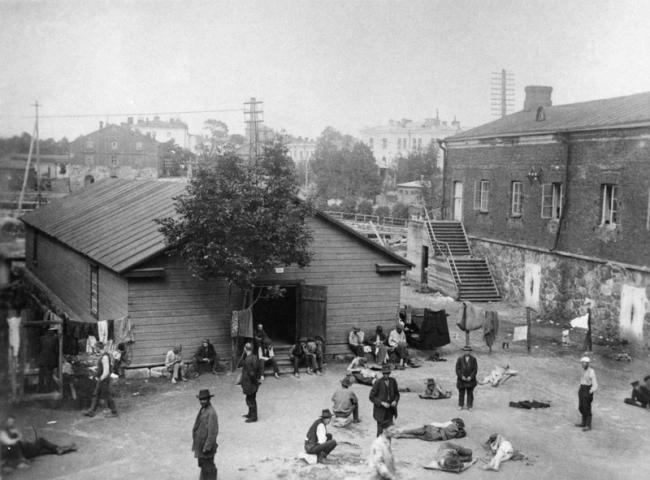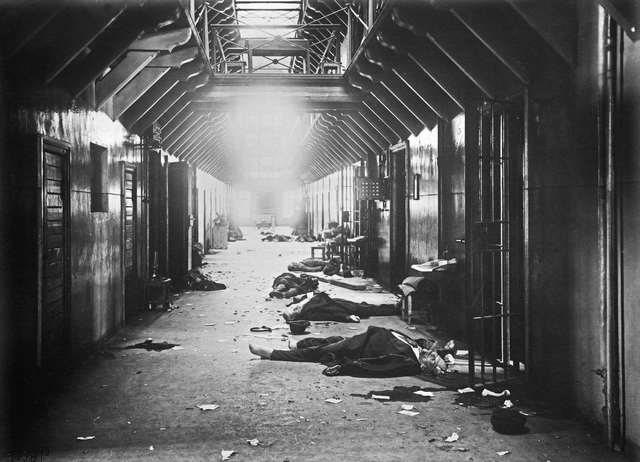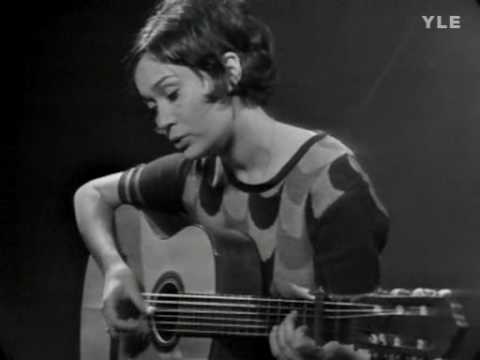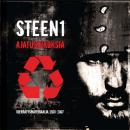On luonto jylhä, rajumyrskyt pauhaa
ja niin synkkä on toiveitteni maa.
Nyt ryöstettynä ompi multa kaikki,
tätä kurjuutta kärsiä mä saan.
Oli mulla ennen pieni kaunis koti,
jossa vanhempani mua hoiteli.
Siellä äiti pikkusiskoani
kehdossansa hellin tuuditti.
Mutta pommitus sen multa poies ryösti,
rajumyrskyt kaatoivat mun kotini.
Lahtareitten luodit isän hengen riisti,
murhe hautaan vei mun rakkaan äitini.
Mun isäin lepää sorakuopass' tuolla,
hän on tutkimatta teloitettuna.
Ja äitiraukka nukkuu nurmen alla,
rauhallisna uinuu viime untansa.
Heidän haudallensa istutan mä ruusun,
ja sen kostutan mä kyynelilläni.
Sitä ruusua ei sortovalta kaada,
sen puolest' annan vaikka henkeni.
Kerran vielä tulee toisenlainen aika,
kerran sortovalta vahva lannistuu.
Kansa sorrettu rivinsä kun nostaa,
lahtarit ne silloin kauhistuu.
Silloin köyhä kansa niiltä vallan ottaa,
silloin uusi aika koittaa työläisten.
Silloin poistamme me sortovallan kahleet
ja punaorvon valan vannomme!
ja niin synkkä on toiveitteni maa.
Nyt ryöstettynä ompi multa kaikki,
tätä kurjuutta kärsiä mä saan.
Oli mulla ennen pieni kaunis koti,
jossa vanhempani mua hoiteli.
Siellä äiti pikkusiskoani
kehdossansa hellin tuuditti.
Mutta pommitus sen multa poies ryösti,
rajumyrskyt kaatoivat mun kotini.
Lahtareitten luodit isän hengen riisti,
murhe hautaan vei mun rakkaan äitini.
Mun isäin lepää sorakuopass' tuolla,
hän on tutkimatta teloitettuna.
Ja äitiraukka nukkuu nurmen alla,
rauhallisna uinuu viime untansa.
Heidän haudallensa istutan mä ruusun,
ja sen kostutan mä kyynelilläni.
Sitä ruusua ei sortovalta kaada,
sen puolest' annan vaikka henkeni.
Kerran vielä tulee toisenlainen aika,
kerran sortovalta vahva lannistuu.
Kansa sorrettu rivinsä kun nostaa,
lahtarit ne silloin kauhistuu.
Silloin köyhä kansa niiltä vallan ottaa,
silloin uusi aika koittaa työläisten.
Silloin poistamme me sortovallan kahleet
ja punaorvon valan vannomme!
inviata da Riccardo Venturi - 6/9/2020 - 09:11
Lingua: Inglese
English translation / Traduzione inglese / Traduction anglaise / Englanninkielinen käännös:
katten (Akseli) (L. Trans.)
katten (Akseli) (L. Trans.)
The Oath of a Red Orphan
The nature is rugged, great storms bluster
and the land of my hopes is so gloomy.
Now I have been robbed of everything,
I have to suffer this misery.
I used to have a small, beautiful home,
where my parents took care of me.
There my mother
gently cradled my little sister.
But a bombing stole it all from me,
great storms pushed down my home.
The butchers'1 bullets took my father's life,
and grief took my dear mother to her grave.
My father rests in a gravel pit somewhere out there,
he was executed without a trial.
And my poor mother is sleeping under the grass,
peacefully having her last dream.
I shall plant a rose on their graves,
and moisten it with my tears.
That rose will not be pushed down by tyranny,
I would even give my life for that.
Once there will be a different era,
once the strong tyranny will be brought down.
When the oppressed people will rise again,
the butchers [1] shall be terrified.
That is when the poor people will take over,
that is when a new era of workers will dawn.
That is when we shall remove the chains of oppression
and vow the oath of a Red orphan!
The nature is rugged, great storms bluster
and the land of my hopes is so gloomy.
Now I have been robbed of everything,
I have to suffer this misery.
I used to have a small, beautiful home,
where my parents took care of me.
There my mother
gently cradled my little sister.
But a bombing stole it all from me,
great storms pushed down my home.
The butchers'1 bullets took my father's life,
and grief took my dear mother to her grave.
My father rests in a gravel pit somewhere out there,
he was executed without a trial.
And my poor mother is sleeping under the grass,
peacefully having her last dream.
I shall plant a rose on their graves,
and moisten it with my tears.
That rose will not be pushed down by tyranny,
I would even give my life for that.
Once there will be a different era,
once the strong tyranny will be brought down.
When the oppressed people will rise again,
the butchers [1] shall be terrified.
That is when the poor people will take over,
that is when a new era of workers will dawn.
That is when we shall remove the chains of oppression
and vow the oath of a Red orphan!
[1] Lahtari is a term the Reds used about the Whites. It cannot be translated, but butcher is close enough. (translator's original note)
inviata da Riccardo Venturi - 6/9/2020 - 10:08
Lingua: Russo
Traduzione russa / Russian translation / Traduction russe / Venäjänkielien käännös:
nice nik (L. Trans.)

nice nik (L. Trans.)

A concentration camp for Red prisoners in Suomenlinna (Helsinki). Some 12,500 Red prisoners died in such camps due to malnutrition and disease.
Клятва красного сироты
Суровая природа, бушует шторм
и так темна земля моих надежд.
Теперь, лишённый всего, что было у меня,
эту боль я обречён нести.
Раньше у меня был маленький красивый домик,
где мои родители заботились обо мне.
Там мама ласково убаюкивала
в колыбели мою младшую сестрёнку.
Но бомбёжка лишила меня всего этого,
жестокие бури разрушили мой родимый дом.
Пулей белогвардейца была отнята жизнь моего отца,
горе свело мою дорогую мать в могилу.
Мой отец покоится прямо там, в яме с гравием,
он был казнён без суда.
И бедная мама спит под землёй,
безмятежно спит последним сном.
Я сажаю розу на их могилу
и орошаю её своими слезами.
Роза не будет свержена тиранией,
я готов положить на это свою жизнь.
Когда-нибудь обязательно наступит новая эпоха,
Тогда падёт жестокая власть угнетателей.
Измученный народ восстанет,
белые убийцы будут в ужасе.
Вот тогда-то бедный народ и возьмёт над ними верх,
тогда-то и наступит новое время - время рабочих людей.
Тогда мы сбросим оковы угнетения
и дадим клятву, клятву красного сироты!
Суровая природа, бушует шторм
и так темна земля моих надежд.
Теперь, лишённый всего, что было у меня,
эту боль я обречён нести.
Раньше у меня был маленький красивый домик,
где мои родители заботились обо мне.
Там мама ласково убаюкивала
в колыбели мою младшую сестрёнку.
Но бомбёжка лишила меня всего этого,
жестокие бури разрушили мой родимый дом.
Пулей белогвардейца была отнята жизнь моего отца,
горе свело мою дорогую мать в могилу.
Мой отец покоится прямо там, в яме с гравием,
он был казнён без суда.
И бедная мама спит под землёй,
безмятежно спит последним сном.
Я сажаю розу на их могилу
и орошаю её своими слезами.
Роза не будет свержена тиранией,
я готов положить на это свою жизнь.
Когда-нибудь обязательно наступит новая эпоха,
Тогда падёт жестокая власть угнетателей.
Измученный народ восстанет,
белые убийцы будут в ужасе.
Вот тогда-то бедный народ и возьмёт над ними верх,
тогда-то и наступит новое время - время рабочих людей.
Тогда мы сбросим оковы угнетения
и дадим клятву, клятву красного сироты!
inviata da Riccardo Venturi - 6/9/2020 - 11:12
Lingua: Italiano
Traduzione italiana / Italian translation / Traduction italienne / Italiankielinen käännös:
Riccardo Venturi, 6-9-2020 11:35
Nota. La traduzione è stata condotta interamente sulla traduzione inglese.

Riccardo Venturi, 6-9-2020 11:35
Nota. La traduzione è stata condotta interamente sulla traduzione inglese.

Terrore bianco e Terrore rosso. Esecuzione di massa di 30 prigionieri Bianchi nel carcere di Viipuri (Vyborg), in Carelia.
Giuramento di un orfano Rosso
Aspra la natura, infuriano gran tempeste
e la terra delle mie speranze è tanto cupa.
Ora sono stato derubato di ogni cosa,
devo patire questa miseria.
Avevo una bella casetta
Dove i miei genitori si prendevano cura di me.
Là, mia madre cullava
piano piano la mia sorellina.
Ma un bombardamento mi tolse tutto,
grandi bufere abbatterono la mia casa.
I proiettili dei “Macellai” tolsero la vita a mio padre,
e mia madre andò nella tomba per il dolore.
Mio padre giace in una cava di ghiaia da qualche parte,
è stato condannato a morte e fucilato senza processo.
E la mia povera madre dorme sotto un prato,
sognando in pace il suo ultimo sogno.
Pianterò una rosa sulle loro tombe
e la annaffierò con le mie lacrime.
Quella rosa non sarà abbattuta dalla tirannia,
per questo son disposto persino a dare la vita.
Un giorno spunterà una nuova era,
quando la forte tirannia sarà abbattuta.
Quando il popolo oppresso insorgerà di nuovo,
i Macellai si sentiranno terrorizzati.
Sarà quando la povera gente avrà il sopravvento,
sarà quando una nuova era sorgerà per i lavoratori.
Sarà quando spezzeremo le catene dell'oppressione
tenendo fede al giuramento di un orfano Rosso!
Aspra la natura, infuriano gran tempeste
e la terra delle mie speranze è tanto cupa.
Ora sono stato derubato di ogni cosa,
devo patire questa miseria.
Avevo una bella casetta
Dove i miei genitori si prendevano cura di me.
Là, mia madre cullava
piano piano la mia sorellina.
Ma un bombardamento mi tolse tutto,
grandi bufere abbatterono la mia casa.
I proiettili dei “Macellai” tolsero la vita a mio padre,
e mia madre andò nella tomba per il dolore.
Mio padre giace in una cava di ghiaia da qualche parte,
è stato condannato a morte e fucilato senza processo.
E la mia povera madre dorme sotto un prato,
sognando in pace il suo ultimo sogno.
Pianterò una rosa sulle loro tombe
e la annaffierò con le mie lacrime.
Quella rosa non sarà abbattuta dalla tirannia,
per questo son disposto persino a dare la vita.
Un giorno spunterà una nuova era,
quando la forte tirannia sarà abbattuta.
Quando il popolo oppresso insorgerà di nuovo,
i Macellai si sentiranno terrorizzati.
Sarà quando la povera gente avrà il sopravvento,
sarà quando una nuova era sorgerà per i lavoratori.
Sarà quando spezzeremo le catene dell'oppressione
tenendo fede al giuramento di un orfano Rosso!
Lingua: Finlandese
This song is known to exist in many slightly different versions. The one posted here is performed by KOM-teatteri on their 1972 album Kansainvälinen (The Internationale). Titled Sotaorvon vala (The Oath of A War Orphan), my contribution below is from 1969 and performed by Heli Keinonen on her album Työväen lauluja 1906 - 1930 (Working Man's Songs 1906 - 1930).


Heli Keinonen.
SOTAORVON VALA
On luonto jylhä, rajumyrskyt pauhaa
ja niin synkkä on toiveitteni maa.
On ryöstetty multa isä, äiti,
ja kurjuutta nyt kärsiä mä saan.
Oli minullakin ennen kaunis koti,
jossa vanhempani mua hoiteli,
vaan pommitus se multa kaiken ryösti
ja kova onni mua kohtasi.
Muistan vielä, kuinka herttaisesti
isä ennen mulle lauleli
ja äiti pientä siskoani
lattialla kehdoss' tuuditti.
Mun isäin lepää sorakuopass' tuolla,
hän on tutkimatta teloitettuna,
ja äiti makaa tuolla nurmen alla,
rauhallisna uinuu viime untansa.
Heidän haudallensa istutan mä ruusun
ja kostutan sen kyynelilläni.
Sitä ruusua ei sortovalta kaada,
sen puolest' annan vaikka henkeni.
Tulee vielä toinenkin aika,
jolloin sorron yöstä mekin nousemme.
Silloin poistamme me riistovallan kahleet
ja sotaorvon valan vannomme.
On luonto jylhä, rajumyrskyt pauhaa
ja niin synkkä on toiveitteni maa.
On ryöstetty multa isä, äiti,
ja kurjuutta nyt kärsiä mä saan.
Oli minullakin ennen kaunis koti,
jossa vanhempani mua hoiteli,
vaan pommitus se multa kaiken ryösti
ja kova onni mua kohtasi.
Muistan vielä, kuinka herttaisesti
isä ennen mulle lauleli
ja äiti pientä siskoani
lattialla kehdoss' tuuditti.
Mun isäin lepää sorakuopass' tuolla,
hän on tutkimatta teloitettuna,
ja äiti makaa tuolla nurmen alla,
rauhallisna uinuu viime untansa.
Heidän haudallensa istutan mä ruusun
ja kostutan sen kyynelilläni.
Sitä ruusua ei sortovalta kaada,
sen puolest' annan vaikka henkeni.
Tulee vielä toinenkin aika,
jolloin sorron yöstä mekin nousemme.
Silloin poistamme me riistovallan kahleet
ja sotaorvon valan vannomme.
inviata da Juha Rämö - 6/9/2020 - 13:39
The third word of the Finnish lyrics should read »jylhä« instead of »jyljä«.
Juha Rämö - 6/9/2020 - 12:54
@ Juha Rämö
Thank you. The spelling mistake has been corrected.
I seize the occasion to point out one interesting Finnish word, orpo (gen. orvon) “orphan”. This is a good example of a very, very old loanword from Indo-European, or from some kind of prehistoric Indo-European language (who knows what): cfr. Greek ὀρφανός [orphanós] or Latin orbus (it. orbo) “blind; one-eyed; bereaved”. An orphan is someone “bereaved” or “deprived” from his/her parents, as if he/she were “made blind”. Finnish includes a whole host of ancient Indo-European loanwords, often no longer attested in historic Indo-European languages. Of course, this has nothing to do with this song, but it is part of the fascinating history of the Finnish language.
Thank you. The spelling mistake has been corrected.
I seize the occasion to point out one interesting Finnish word, orpo (gen. orvon) “orphan”. This is a good example of a very, very old loanword from Indo-European, or from some kind of prehistoric Indo-European language (who knows what): cfr. Greek ὀρφανός [orphanós] or Latin orbus (it. orbo) “blind; one-eyed; bereaved”. An orphan is someone “bereaved” or “deprived” from his/her parents, as if he/she were “made blind”. Finnish includes a whole host of ancient Indo-European loanwords, often no longer attested in historic Indo-European languages. Of course, this has nothing to do with this song, but it is part of the fascinating history of the Finnish language.
Riccardo Venturi - 6/9/2020 - 13:24
Can you please change the title of my contribution into Sotaorvon vala.
Juha Rämö - 6/9/2020 - 14:36
@ Riccardo Venturi
According to Suomen sanojen alkuperä (The Origin of Finnish Words), the word orpo comes from Proto-Indo-Iranian *arbha-s.
According to Suomen sanojen alkuperä (The Origin of Finnish Words), the word orpo comes from Proto-Indo-Iranian *arbha-s.
Juha Rämö - 6/9/2020 - 14:37
@ Juha Rämö
Not only have I changed the title of your contribution, but -as you can see- I have also added this alternative title to the song page. I think this is a way to give the song a more general meaning: war creates orphans on all sides.
PS thank you for showing the exact etymology of the word orpo. As far as I remember, contacts between Protofinns and Proto-Indoiranians have given another very common Finnish word, sata, the number 100.
Not only have I changed the title of your contribution, but -as you can see- I have also added this alternative title to the song page. I think this is a way to give the song a more general meaning: war creates orphans on all sides.
PS thank you for showing the exact etymology of the word orpo. As far as I remember, contacts between Protofinns and Proto-Indoiranians have given another very common Finnish word, sata, the number 100.
Riccardo Venturi - 6/9/2020 - 18:21
@ Riccardo Venturi
Thank you for naming the page according to both titles. However, it should read »tai« instead of »jai« and without the comma.
Right you are. The Finnish word sata comes from Proto-Indoiranian *ćatám (in Sanskrit śatám and in Avestan satəm).
By the way, Orpo is also a Finnish family name and as such the genitive form of it is Orpon instead of Orvon, i.e. without consonant gradation. The same applies to all the cases of the name (Orpolle, Orpolta, etc.).
Thank you for naming the page according to both titles. However, it should read »tai« instead of »jai« and without the comma.
Right you are. The Finnish word sata comes from Proto-Indoiranian *ćatám (in Sanskrit śatám and in Avestan satəm).
By the way, Orpo is also a Finnish family name and as such the genitive form of it is Orpon instead of Orvon, i.e. without consonant gradation. The same applies to all the cases of the name (Orpolle, Orpolta, etc.).
Juha Rämö - 6/9/2020 - 19:29
@ Juha Rämö
Thank you for correcting my mistake in the title. That's a good exemple of excessive self-confidence, and of laziness, too: I remembered that “or” is something with -ai in Finnish, but I had no wish to check in a dictionary (exactly 20 cm from my table). So, I invented a new Finnish particle :-)
Thank you for correcting my mistake in the title. That's a good exemple of excessive self-confidence, and of laziness, too: I remembered that “or” is something with -ai in Finnish, but I had no wish to check in a dictionary (exactly 20 cm from my table). So, I invented a new Finnish particle :-)
Riccardo Venturi - 6/9/2020 - 22:06
×
![]()





Finlandia, 1918. La città di Tampere in rovine.
La Guerra civile finlandese fu combattuta nell'arco di tre mesi e mezzo, dal 27 gennaio al 15 maggio 1918, per il controllo della Finlandia durante la transizione del paese da granducato dell'Impero Russo a stato indipendente. Da un lato i “Rossi”, guidati da una parte del Partito Socialdemocratico e sostenuti dalla neonata Russia sovietica, dall'altro i “Bianchi”, guidati dal Senato a maggioranza conservatrice e coadiuvati dall'Armata Imperiale tedesca. Le “Guardie Rosse”, formazioni paramilitari composte prevalentemente da lavoratori industriali e agricoli, controllavano le città e i centri industriali della Finlandia meridionale; le “Guardie Bianche”, anch'esse organizzate come milizia, e composte di proprietari terrieri e membri della media e alta borghesia, controllavano le zone rurali della Finlandia centrale e la Finlandia settentrionale. La vittoria schiacciante delle Guardie Bianche nella guerra civile (che provocò circa 40.000 vittime) portò alla divisione del paese; i leaders delle “Guardie Rosse” si rifugiarono nella Russia Sovietica, dando luogo al Partito Comunista di Finlandia. Gli avvenimenti del 1918 non sono, ovviamente, univoci. Se ci fu, sia durante la breve guerra civile, sia -soprattutto- dopo di essa un “terrore bianco” con vendette ed esecuzioni senza processo, esistette anche un “terrore rosso” che gli fece da contraltare durante i mesi di guerra. Il contesto storico provocato dalla I guerra mondiale e dall'appena avvenuta Rivoluzione d'Ottobre ebbe immediate ripercussioni in Finlandia, con la guerra mondiale non ancora conclusa. Furono eventi che, in Finlandia, non cessarono di avere lunghissime conseguenze: dalla quasi presa del potere del Kokoomus parafascista negli anni '30 all'invasione sovietica della Finlandia nel 1939/40, con la conseguente strenua resistenza finlandese guidata proprio dal quel maresciallo Gustav Mannerheim che era stato leader delle “Guardie Bianche” nel 1918; dall'annessione sovietica della storica regione della Carelia fino alla “finlandizzazione” post-bellica, quando per la Finlandia fu stabilito di conservare il sistema economico ed una democrazia pluripartitica, però in regime di “convivenza fattiva e pacifica” con l'Unione Sovietica. Da ricordare anche che finlandesi come Otto Kuusinen ebbero un ruolo importante nell'Unione Sovietica (anch'egli era fuggito in Russia dopo la guerra civile del 1918). Quasi e tragicamente logico il corollario dei campi di concentramento riservati ai "Rossi" dopo la conclusione della guerra civile: si calcola che vi siano periti circa 12.500 prigionieri di stenti e malnutrizione.
Al pari di Kuolemaantuomitun hyvästijättö, la canzone che qui si presenta è una testimonianza di quella oramai lontana guerra civile, e come tale deve essere presa. Le guerre civili sono, in genere, tutta una serie di “terrori” reciproci. Ciò non toglie nulla all'oggettiva e struggente bellezza di questo anonimo canto, che, in tempi più recenti, ha avuto un'incisione nel 1972 da parte del KOM-Teatteri (nell'album Kansainvälinen, ovvero “L'Internazionale” -ricordando che tra gli autori della versione finlandese storica dell'Internazionale c'è proprio Otto Kuusinen). Ancor più recente quella del 2013 da parte del duo Ari Numminen & Hannu Kella. Le traduzioni qui riportate in inglese e russo provengono da Lyrics Translate. Quella in inglese è stata fatta da un madrelingua finlandese ed assumo per questo che sia affidabile; ciò non toglie che traduzioni alternative siano le benvenute. [RV]